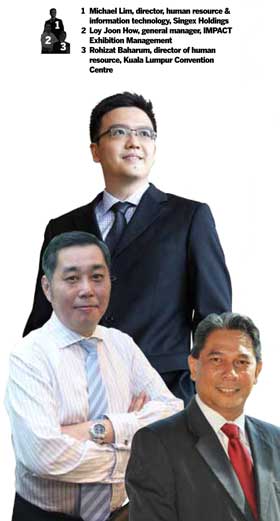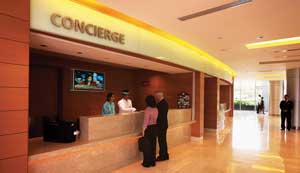From free skills training and encashable points for best performance to matchmaking parties, Asian convention centres are beating the industry’s manpower crunch with unique solutions to build staff capability, loyalty and retention. By Karen Yue
 The acute shortage of talents in Asia’s business events industry is not a new problem, but it is one that is being compounded over time as destinations rapidly expand their arsenal of event hardware – which must be brought to life by humans – to cater to intensifying MICE demand and higher quality expectations.
The acute shortage of talents in Asia’s business events industry is not a new problem, but it is one that is being compounded over time as destinations rapidly expand their arsenal of event hardware – which must be brought to life by humans – to cater to intensifying MICE demand and higher quality expectations.
Factors contributing to the manpower strain include the short supply of new blood and what is said to be the arduous working conditions of the business events industry.
“Not only does the industry grow faster than the rate schools can churn out trained individuals for the marketplace, many MICE professionals exit due to the long hours and heavy workload,” said Michael Lim, director, human resource & information technology at Singex Holdings, the company behind Singapore Expo Convention and Exhibition Centre.
Oh, what woes!
Besides an inability to deliver quality service, convention centres lacking sufficient and experienced staff can risk a “loss of current and potential clients”, said Rohizat Baharum, director of human resource at Kuala Lumpur Convention Centre, and be put at a “serious competitive disadvantage” according to Loy Joon How, general manager of IMPACT Exhibition Management, Thailand.
“The impact of poor service on an organisation’s reputation cannot be underestimated as it can affect business and revenue,” warned Rohizat.
“High staff turnover and frequent changes (in personnel) is disruptive to operations and the business too,” said Tony Xu, vice president of China National Convention Center (CNCC).
Middle and senior management personnel are said to be the hardest to hire.
“The dearth of good mid-level manpower affected our ability to scale our business effectively and efficiently in the way we had envisioned. While we had an ambitious growth plan, our journey was hindered by the labour crunch and we had to rely heavily on technology by either upgrading our current system or buying new ones to ensure consistency and predictability in service delivery and (client satisfaction),” said Lim.
Once the right people are hired, there comes the challenge of retention.
“The turnover rate of the Gen X and Y workforce, which makes up the bulk of staff in many corporations today, tends to be higher,” Loy observed. “These generations have organisational needs and expectations that are different from those of the baby boomer era.
“Unfortunately, most companies are not doing enough to actively engage these (people) to provide them with a stimulating working environment.”
Rohizat added: “It is not easy to retain staff as they constantly have doors opening for them.”
Human resource chiefs bemoaned poaching by competing venues and other related or similar businesses as being all too common.
Staying power
Convention centres in Asia have devised numerous solutions to retain staff, most of which seek to grow the individual’s capabilities and improve his/her career advancement opportunities within the company.
Kuala Lumpur Convention Centre’s Ambassador Programme targets flexible employees who are often the first to interact with clients and guests. It offers a skills training module developed by experienced departmental trainers and meeting industry professionals. Participants are given a ‘Passport to Success’ in which classes undertaken by the ‘ambassador’ are recorded. Since its launch in 2005, over 6,700 individuals have graduated from the programme.
Kuala Lumpur Convention Centre went on to launch the Talent Acceleration Programme (TAP) on November 18 last year, an 18-month scheme designed to expedite the development of its managerial talent pool. Starting off in December with an intake of 24 people, the programme comprises field trips, experiential learning sessions, internal and external leadership sharing and mentoring, as well as exposure to competencies such as commercial awareness, customer focus and change management, among others.
Rohizat said TAP graduates would be “eligible for higher positions” within the organisation.
Peter Brokenshire, who will retire from his position as general manager of Kuala Lumpur Convention Centre at end-March, shared at a session at the 52nd ICCA Congress that communication with all staff is encouraged through an activity called Coffee With Datuk.
“Once a month rank-and-file members are welcome to have an open conversation with me in my office. They can raise any issues and offer ideas. It was through this that we heard the concerns of our staff and responded by improving the quality of staff meals and maternity benefits, for instance,” he said.
At Singex Holdings, incentive trips and opportunities to enrol in overseas diploma and degree courses by the International Association of Congress Centres (often referred to as AIPC) are offered to staff.
Lim said the management of Singex Holdings would “even realign (employees’) job scope to allow them to be more engaged with the overall strategic corporate direction.”
IMPACT Exhibition Management rewards top performers with all-expense-paid incentive trips to destinations like South Korea, Hong Kong and Japan, and implements an annual staff engagement survey index that measures how the company is doing in fostering and developing a stimulating working environment.
According to Loy, the index is an integrated part of the company’s KPI, as “equal focus” is placed on both financial and human capital performance.
“The saying, ‘staff don’t quit working for companies; they quit working for their bosses’, rings true. We believe that good leadership is key to hiring, developing and retaining talents, (and will help to) create a healthy, dynamic and positive company culture that fosters a motivated and engaged workforce. (Such a) workforce is less likely to suffer from high staff turnover,” said Loy.
IMPACT Exhibition Management not only focuses on cultivating good leadership, it also invests in training and skills development. Loy revealed that the company’s human resource training and skills development budget had tripled “over the last couple of years”.
“We have also adopted a management style based on staff engagement and empowerment. This has helped to develop a sense of ownership and accountability among all levels of staff (which boosted loyalty and) reduced staff turnover.”
At CNCC, staff retention initiatives take an unusual spin. “China’s one-child policy has created a generation of lonely people who crave friendship. So we play the role of the parent and hold regular matchmaking parties for all our single employees and have eight staff clubs that provide recreation and self-improvement activities,” Xu said.
Money talks
Monetary rewards are also dangled to encourage the best in service delivery and inspire loyalty.
Brokenshire said staff who “go above and beyond their call of duty” are rewarded with shopping vouchers and points that come with a cash value. Bonus points are also given whenever a staff member receives a compliment from a guest and when the entire team excels in a particular job or project.
CNCC helps to lighten employees’ financial burden by offering heavily subsidised accommodation.
Xu said: “Accommodation is very costly in Beijing, so CNCC bought over a building, converted it into a staff dormitory and offered a roof over employees’ heads for just US$20 a month. Free Wi-Fi is also thrown in so they can stay in touch with loved ones.”

Returns on investment
Kuala Lumpur Convention Centre has maintained an enviable staff turnover of under two per cent since its opening in 2003, while its regular senior management retreats, which comprise teambuilding activities and meetings on future business strategies, have yielded “fantastic” and profitable ideas.
“For example, in 2008 when business was challenging, the management retreat proposed offering free flow of food and drinks to attract meetings. That idea spurred the creation of meeting packages that are now a RM10 million (US$3.1 million) business,” said Brokenshire.
CNCC sees a six to seven per cent staff turnover, a figure Xu is comfortable with.
Loy said: “By and large, from the results of our staff engagement surveys, I think we have been rather successful in attracting, developing and retaining our talents. Our turnover rates and cost of hiring and replacing staff have all been reduced.
“More importantly, we are achieving better than expected scores in our Customer Satisfaction Survey Index which shows an increase in our capability as a company to (meet and exceed) the needs of our customers.
“With a better engaged workforce, ideas on new and innovative products and services such as our Complete Meeting Package, Healthy Coffee Break Package, Customized Logo booth catering services, etc have all been rolled out successfully over the last few years. Productivity and internal communications have also improved.”






















